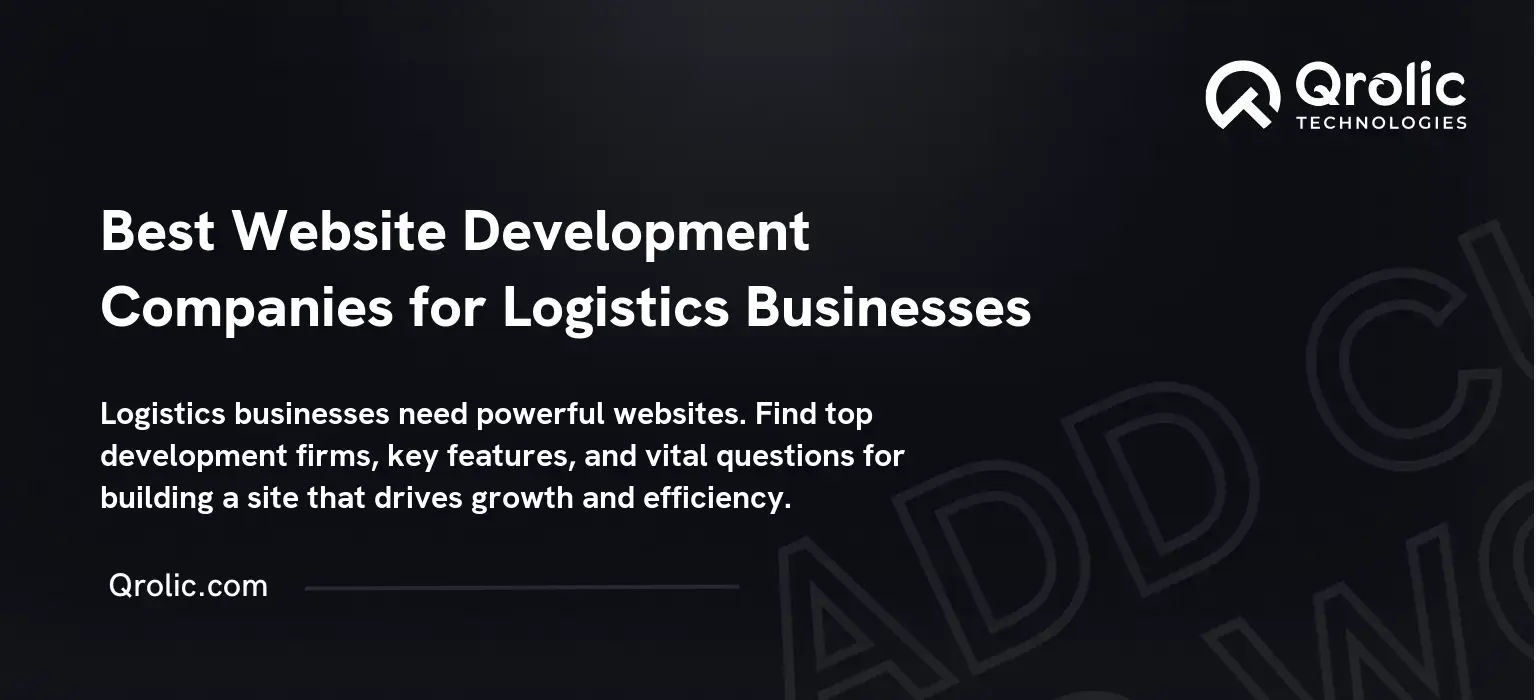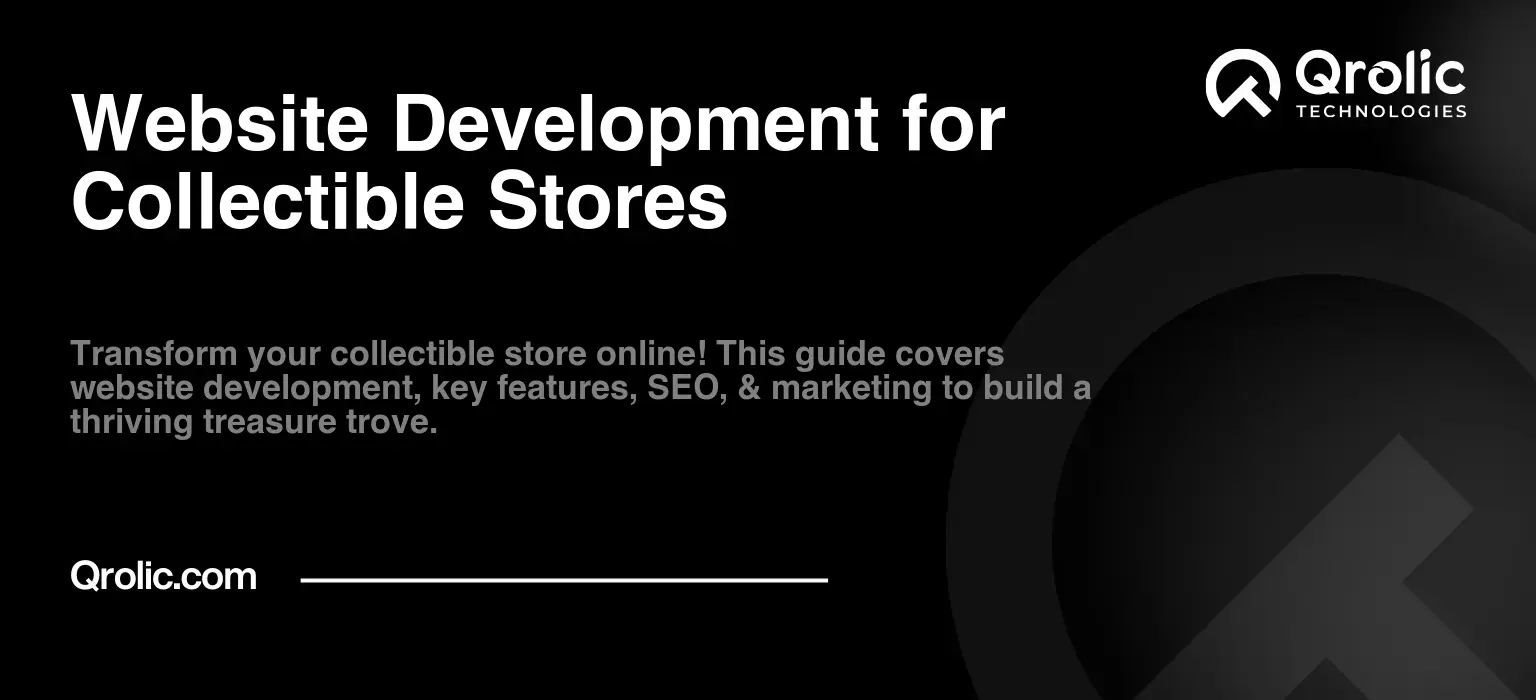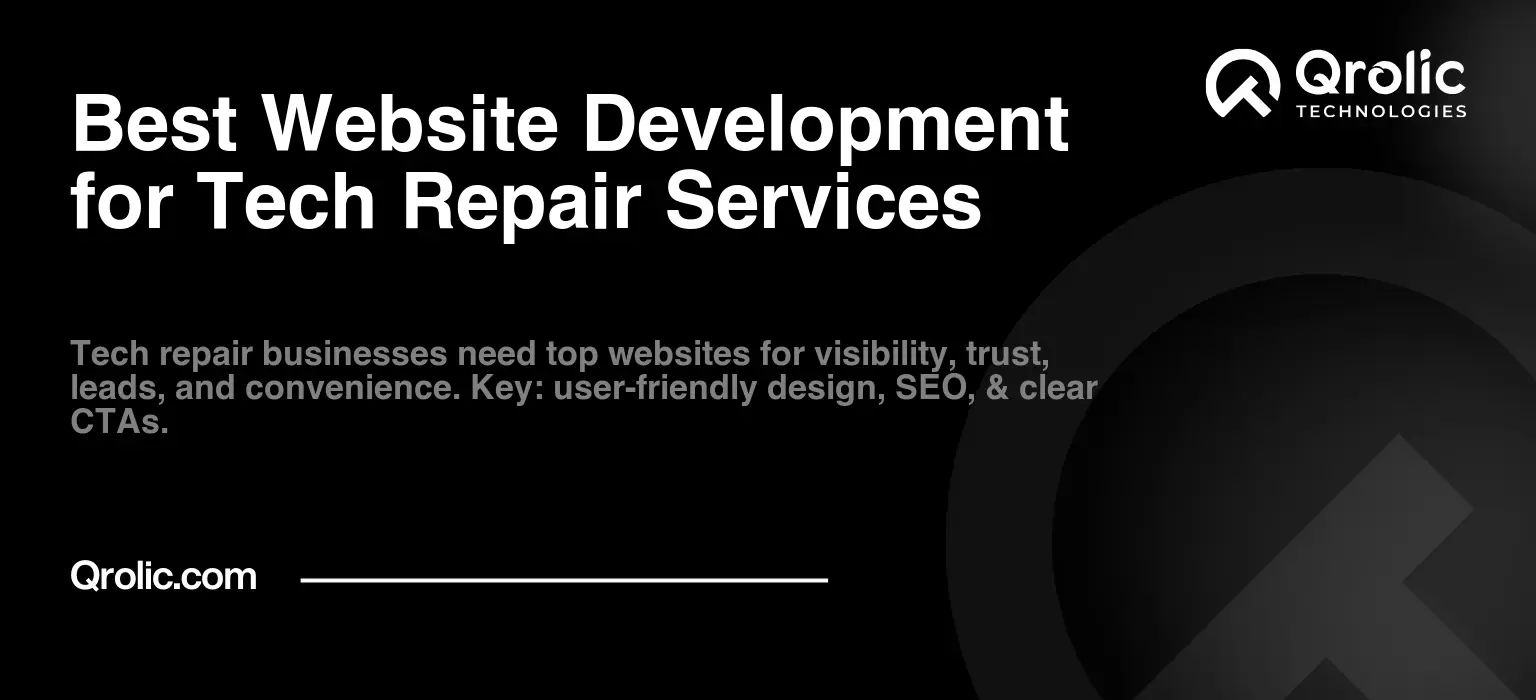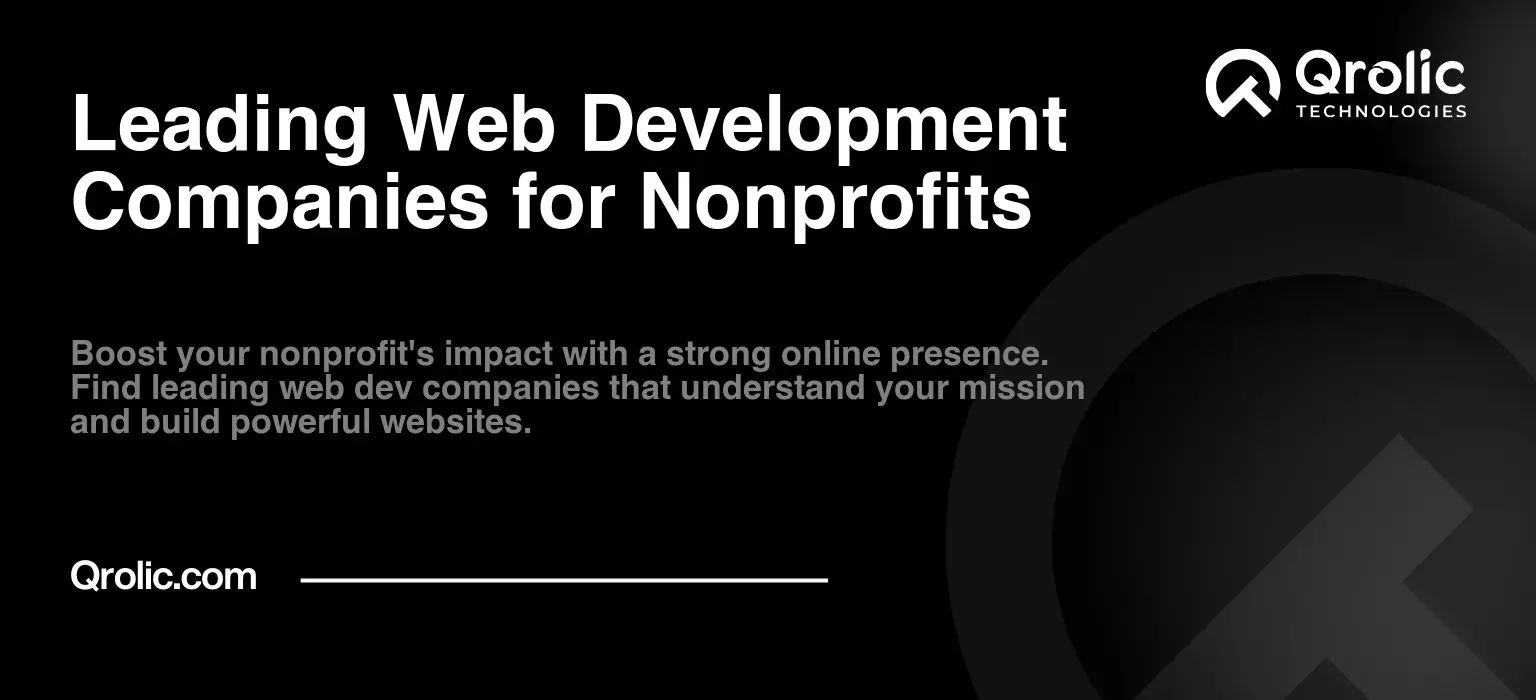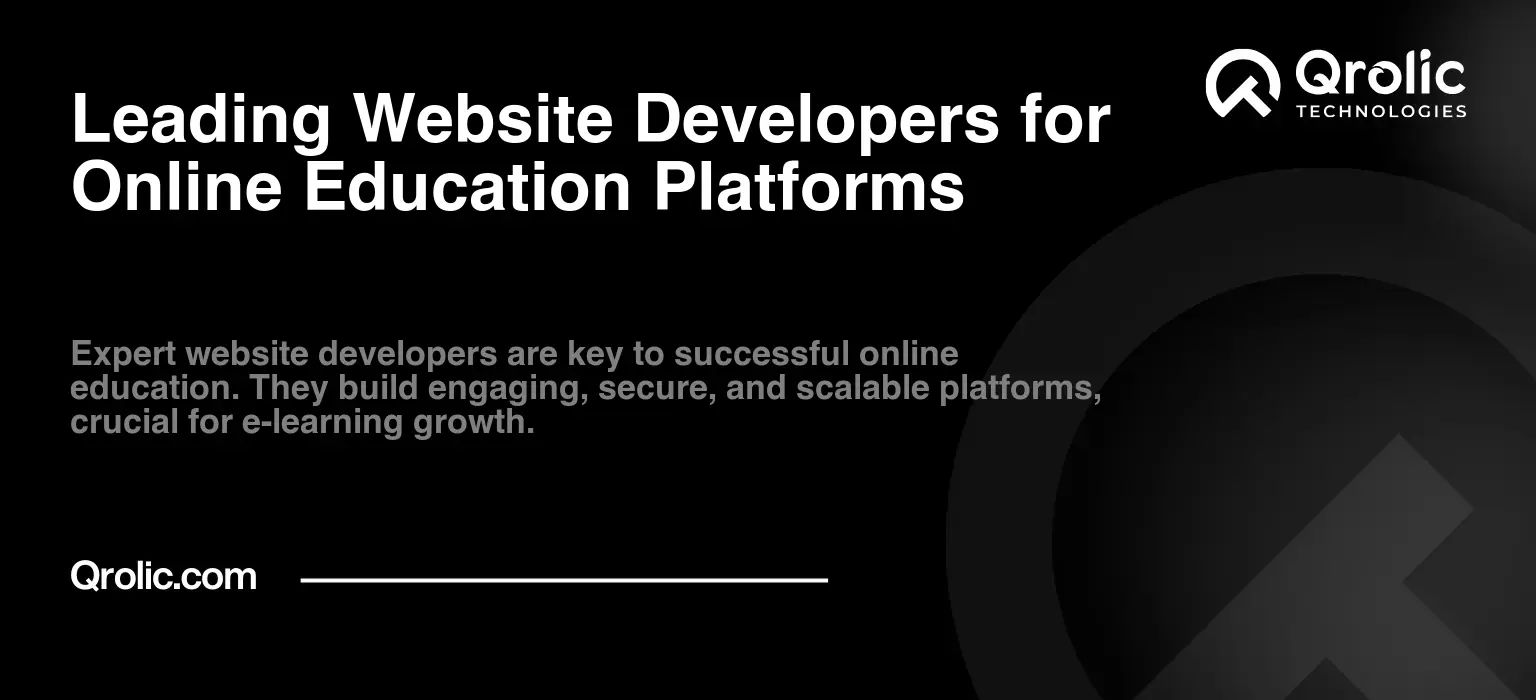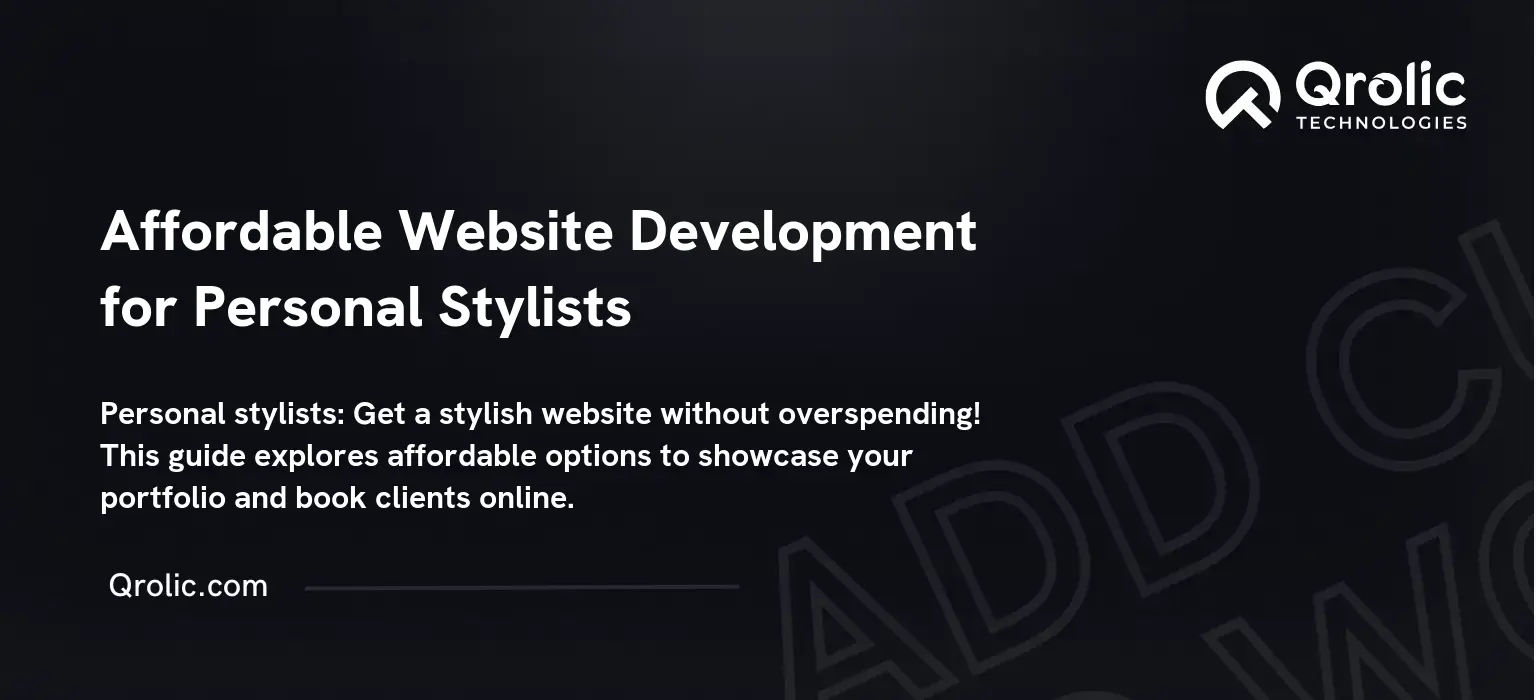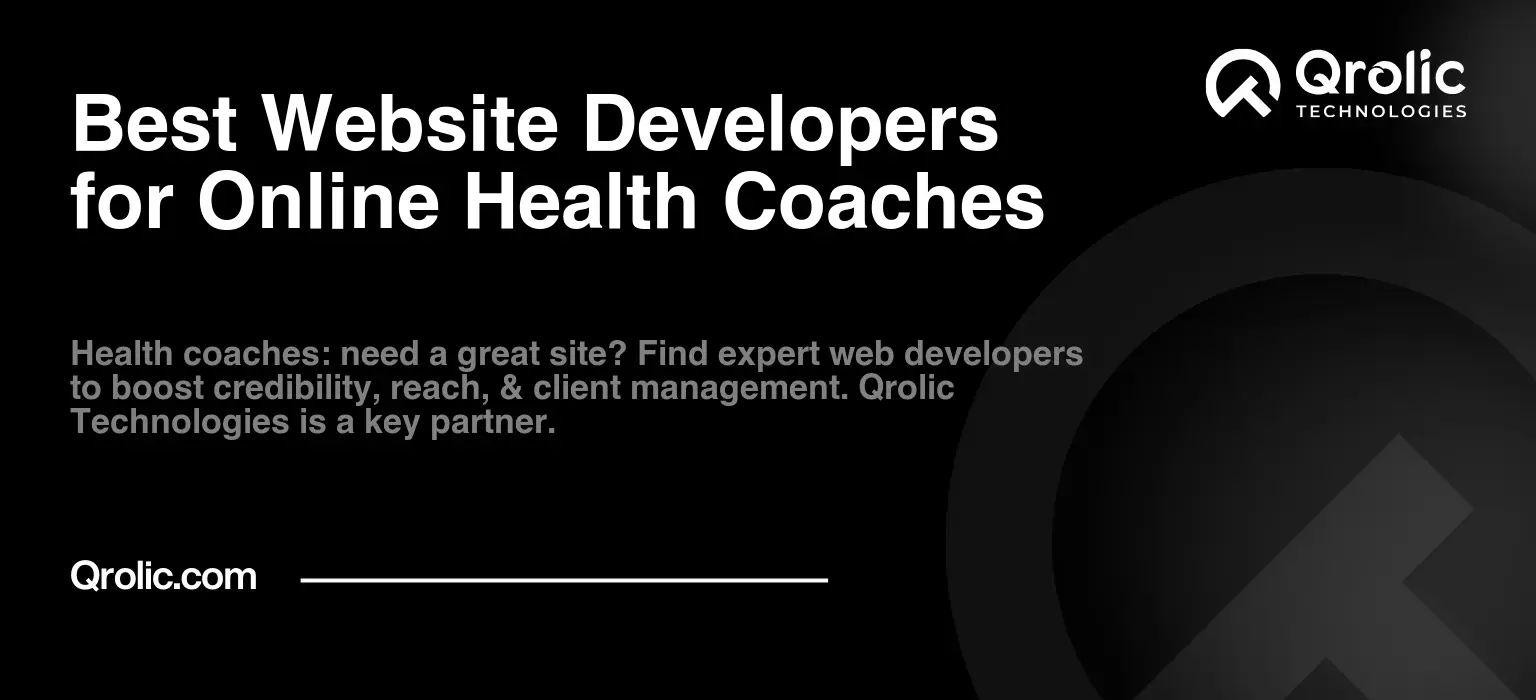In today’s fast-paced world, the logistics industry is more reliant than ever on technology. A powerful, user-friendly website isn’t just a luxury; it’s a crucial asset. It’s the digital face of your operation, the hub for customer interaction, and a powerful engine for growth. But, with so many web development companies out there, finding the right partner to build or revamp your logistics website can feel overwhelming. This article dives deep into what to look for in a logistics web development company, showcasing the best options and providing you with actionable insights to make the right choice.
Quick Summary:
- A strong website is crucial for logistics growth.
- Ensure your site has tracking, mobile design, and SEO.
- Define needs and ask developers key industry questions.
- Use great content and analytics for ongoing success.
Table of Contents
- The Critical Role of a Website in the Logistics Industry
- Why Logistics Businesses Need a Strong Online Presence
- Key Features of a High-Performing Logistics Website
- Identifying Your Needs: Before You Hire
- Defining Your Goals and Objectives
- Gathering Requirements and Content
- Essential Questions to Ask Potential Web Development Companies
- Top Website Development Companies for Logistics Businesses
- The Development Process: A Step-by-Step Guide
- Strategies for a Successful Logistics Website
- Content is King: Creating Engaging & Informative Content
- The Importance of SEO in Logistics Web Design
- Analyzing Performance and Making Improvements
- Conclusion
The Critical Role of a Website in the Logistics Industry
Before we delve into choosing a website development partner, let’s understand why a well-crafted website is non-negotiable for logistics companies.
Why Logistics Businesses Need a Strong Online Presence
- First Impressions Matter: Your website is often the first interaction a potential client has with your company. A professional, well-designed website builds trust and credibility instantly. If it’s clunky or outdated, it sends a signal that your business might be the same.
- Lead Generation Powerhouse: Your website is the perfect place to capture leads. Through forms, contact details, and engaging content, you can convert site visitors into potential customers.
- 24/7 Information Portal: Customers want instant access to information. Your website serves as a round-the-clock portal where clients can track shipments, request quotes, and find answers to frequently asked questions, improving customer satisfaction.
- Competitive Advantage: In a competitive market, a well-optimized website can differentiate you from the crowd. It highlights your unique offerings, areas of expertise, and customer testimonials, giving you a much-needed edge.
- Streamlined Operations: By integrating your website with other systems (like booking portals, CRM, and tracking software), you can automate tasks, reduce manual errors, and significantly improve efficiency.
Key Features of a High-Performing Logistics Website
When choosing a web development company, ensure they understand and can implement the essential features that make a logistics website shine:
- Clear Navigation & Intuitive User Interface (UI): The site must be easy to navigate. Customers should effortlessly find the information they need without any friction. Confusing layouts lead to high bounce rates.
- Mobile-First Design: More than ever, customers are accessing the web via smartphones. A responsive, mobile-first design ensures a seamless experience on all devices.
- Robust Tracking & Management Systems: Customers expect up-to-date tracking capabilities. Your website should allow customers to track shipments, view delivery timelines, and manage their accounts.
- Online Booking & Quoting: Make it easy for customers to request quotes, book shipments, and pay for services online. This automation saves time and resources for both your team and your clients.
- Scalability & Future-Proof Design: The website must be built to handle growing traffic and expanding features without any hiccups. It should also adapt to any industry changes or technology advancements.
- Search Engine Optimization (SEO): An SEO-friendly website is crucial for visibility. The right web development partner should know how to optimize your content and site structure for better search engine rankings.
- Security: Security is of utmost importance in the logistics sector, especially when dealing with sensitive customer data. The chosen website should be built with robust security features to avoid any data breaches.
- Integration with Logistics Software: Seamlessly integrating the website with your logistics software will optimize workflows and provide a better overall experience for customers.
- Multilingual & Multi-Currency Support: For companies operating internationally, multilingual and multi-currency capabilities are essential to cater to a diverse clientele.
- Content Management System (CMS): A user-friendly CMS will empower you to update your site content easily, keeping your information fresh and relevant.
Identifying Your Needs: Before You Hire
Before you reach out to various website development companies, it’s crucial to take some time to define your specific needs and goals. This will help you narrow down your options and find the best partner for your unique situation.
Defining Your Goals and Objectives
- What problem do you want to solve with your new website? Are you looking to increase leads, improve customer satisfaction, streamline operations, or something else?
- Who is your target audience? Understanding your ideal customer’s profile will influence the design and functionality of your website.
- What are your unique selling propositions? What makes you different from your competitors? Your website should clearly highlight these aspects.
- What specific features and functionalities do you need? Do you require shipment tracking, online booking, or other specific tools?
- What is your budget? Knowing your budget will help you focus on companies that align with your financial parameters.
- What is your timeline? When do you need the website launched?
- What kind of long-term support do you need? Will the company provide maintenance, security updates, and technical support after the launch?
Gathering Requirements and Content
Having a well-defined list of requirements and even a content structure beforehand will streamline the development process.
- Compile a list of features: This should include all functionalities you want in the website, from basic elements like contact forms to complex integrations.
- Create a site map: Plan out the structure of your website – the main pages and their hierarchical relationships.
- Gather your content: Collect all your text, images, videos, and any other materials you want on the site. Having your content prepared early makes the process far smoother and quicker.
Essential Questions to Ask Potential Web Development Companies
When you’ve identified some potential partners, it’s crucial to ask the right questions to make sure you find the perfect fit.
- Do you have experience in the logistics industry? Ask to see examples of websites they have developed for logistics or freight companies.
- What is your process for web development? They should clearly outline all the steps involved, from initial design to launch and ongoing support.
- Who will be working on my project? Understand the team’s expertise and ensure you have a direct line of communication with them.
- Can you provide client references? Reach out to past clients to gauge the company’s quality of work and client satisfaction.
- How do you handle SEO? An SEO-friendly website is a must-have. Find out the strategies they use and if they have an in-house SEO team.
- What are your security protocols? Data security should be a top priority. Find out how they protect your site and your customer’s information.
- What kind of support do you offer after the website launch? It’s essential to have ongoing technical support and maintenance services.
- What is your pricing structure? Understand their costs and make sure you know what’s included and what’s not.
- What is the expected turnaround time? Make sure their timeline fits in with your project needs.
- How will they ensure my website is scalable and future-proof? A long-term perspective is crucial for the ongoing success of your website.
Ready to Build Your Next Project?
Let’s turn your ideas into a powerful digital solution. Contact us today to get started with expert web development and design services.
Top Website Development Companies for Logistics Businesses
Now, let’s explore some of the leading web development companies specializing in creating high-performing websites for the logistics industry. While there are numerous options available, we focus on those known for their expertise, quality of work, and deep understanding of the logistics landscape.
-
Qrolic Technologies (https://qrolic.com/) – A noteworthy contender in the web development space, Qrolic Technologies stands out with their holistic approach to crafting custom website solutions for logistics businesses. They understand that a website for a logistics company is much more than just a digital presence; it’s a critical operational tool. They focus on delivering websites that are both user-friendly and robust in terms of functionality. What sets them apart is their emphasis on custom software development. This is essential for integrating complex logistics operations, such as advanced tracking systems and automated booking platforms. They understand that a one-size-fits-all solution rarely works in logistics, and tailor each project to the unique needs of the client. Qrolic Technologies is particularly strong in the following:
- Custom Software Development: Their strength in custom development means they can create the bespoke integrations and functionalities specific to logistics such as real-time tracking systems and automated billing.
- Mobile-First Approach: Qrolic emphasizes creating websites that are fully responsive and deliver an impeccable user experience on all devices.
- SEO Optimization: They integrate best SEO practices to improve site visibility, attracting more organic traffic to your website.
- Dedicated Support Team: Qrolic provides a dedicated team to support clients throughout and after the development process.
-
[Company Name A]: (Replace with a real company). Known for their extensive experience in the transportation sector, [Company Name A] specializes in developing websites for freight forwarding, warehousing, and trucking companies. They offer a wide range of services, including custom web design, eCommerce solutions, and mobile app development. Their deep knowledge of the industry allows them to create highly effective platforms that cater to the needs of logistics businesses.
-
[Company Name B]: (Replace with a real company). [Company Name B] excels at creating scalable websites that integrate seamlessly with logistics software and tools. They focus on providing intuitive user interfaces and secure platforms, which are particularly important for companies handling sensitive information. They offer website maintenance and support packages, providing clients with ongoing assistance.
-
[Company Name C]: (Replace with a real company). A well-regarded agency known for its creative design and technical expertise, [Company Name C] specializes in creating visually stunning and functional websites for various industries, including logistics. They are great for businesses looking for an elevated, sophisticated online presence. They also offer comprehensive digital marketing services that work hand in hand with their web design projects.
-
[Company Name D]: (Replace with a real company). [Company Name D] has a deep understanding of the complexities involved in supply chain management and can build highly functional websites that streamline and automate various business processes, from order management to delivery tracking. Their expertise in integration and automation can be a significant advantage for larger logistics companies.
-
[Company Name E]: (Replace with a real company). [Company Name E] focuses on creating user-friendly web platforms that enhance customer experience and increase lead generation. They combine strategic web design with search engine optimization to ensure businesses achieve maximum online visibility and reach their target audience.
(Note: Replace “[Company Name A]”, “[Company Name B]”, “[Company Name C]”, “[Company Name D]”, “[Company Name E]” with real, well-regarded web development agencies specializing in logistics web design)
The Development Process: A Step-by-Step Guide
Understanding the typical development process will help you manage your expectations and stay involved throughout the project. Here’s a general overview of the process, from the initial consultation to the website launch:
- Discovery & Consultation: This initial stage involves discussing your needs, objectives, and goals. The company will gather information about your business, target audience, and specific requirements.
- Planning & Strategy: Once the project scope is defined, the company will create a detailed project plan. This includes a timeline, budget, and a comprehensive strategy for design and development.
- Design & Wireframing: The design team will create wireframes and mockups of your website. This process helps to visualize the user interface and overall structure of your site.
- Content Integration: The web development team will integrate your content into the design. This includes text, images, videos, and other multimedia elements.
- Development: The actual coding and development of the website happen here. This is where they will implement all the functionalities and features.
- Testing: Before launch, the website will undergo rigorous testing to identify and fix any bugs or errors. User experience testing is also performed to make sure the site is intuitive and easy to navigate.
- Launch: Once all testing is complete, your website will be launched. This will involve moving the site to your chosen server and ensuring it is live and accessible.
- Post-Launch Support: After the website goes live, the web development company should provide ongoing support for maintenance, security updates, and any other technical assistance you may need.
Ready to Build Your Next Project?
Let’s turn your ideas into a powerful digital solution. Contact us today to get started with expert web development and design services.
Strategies for a Successful Logistics Website
Creating a great website is just the beginning. To ensure your website is a powerful tool that drives your business forward, you need to employ effective strategies.
Content is King: Creating Engaging & Informative Content
Your website’s content is what will draw users in and keep them coming back. It’s imperative to craft informative and engaging content tailored to your target audience.
- Blog Posts & Articles: Publish regular blog posts covering industry trends, company news, and helpful information related to logistics and supply chain management. This helps improve your SEO and positions you as a thought leader.
- Case Studies & Testimonials: Showcase successful projects and customer reviews to build credibility and trust with potential clients.
- Detailed Service Pages: Each of your services should have a dedicated page that explains what you offer, how it benefits the customer, and how to get started.
- Informative FAQs: A comprehensive FAQ page answers common questions customers may have about your services, your company, and the logistics process in general.
- Compelling Visuals: Utilize high-quality images, videos, and graphics to enhance your content and make it more appealing to visitors.
The Importance of SEO in Logistics Web Design
Search Engine Optimization (SEO) is the key to ensuring your website is visible to potential customers. Here are some essential SEO strategies:
- Keyword Research: Conduct in-depth keyword research to identify the terms your target audience uses when searching for logistics and freight services. Incorporate these keywords naturally throughout your website content. (keywords like logistics web development, freight company website design, supply chain web designers)
- On-Page Optimization: Optimize your title tags, meta descriptions, headings, and image alt tags to ensure that search engines can understand what your website is about.
- Mobile-Friendliness: Search engines prioritize websites that are mobile-friendly. Make sure your site is responsive and delivers an excellent user experience on all devices.
- Fast Loading Speeds: Optimize your images and website structure to improve page loading speeds. slow loading pages can deter visitors and hurt your search engine rankings.
- Link Building: Build high-quality backlinks from reputable websites in your industry. This signals to search engines that your website is trustworthy and authoritative.
- Local SEO: If you operate in a specific geographic region, optimize your website for local searches, ensuring you appear in local search results.
Analyzing Performance and Making Improvements
Once your website is live, it’s crucial to monitor its performance and make necessary adjustments.
- Utilize Analytics Tools: Tools like Google Analytics can provide valuable insights into user behavior, traffic sources, and website performance.
- Track Key Metrics: Monitor metrics like bounce rate, time on site, conversion rates, and page views to understand what’s working well and what needs improvement.
- Regular Audits: Conduct regular SEO audits to identify technical issues, content gaps, and areas where your website can be optimized for better search rankings.
- Make Data-Driven Decisions: Use the data collected from analytics to make informed decisions about content updates, design changes, and overall website strategy.
Conclusion
Choosing the right website development partner for your logistics business is an investment that will pay dividends for years to come. Your website is not just a marketing tool, but a critical operational asset that can improve customer satisfaction, enhance efficiency, and drive growth. By understanding your specific needs, asking the right questions, and focusing on a robust, scalable, and user-friendly design, you can ensure that your online presence serves your business goals and helps you stay ahead of the competition. Remember that partnering with a company like Qrolic Technologies that understands the complexities of the logistics industry and offers custom software development can provide a distinct competitive advantage, allowing you to create a website perfectly tailored to your specific needs. With a well-planned and executed web strategy, your logistics company can leverage the power of digital to thrive in today’s evolving business environment.
